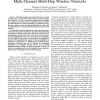Free Online Productivity Tools
i2Speak
i2Symbol
i2OCR
iTex2Img
iWeb2Print
iWeb2Shot
i2Type
iPdf2Split
iPdf2Merge
i2Bopomofo
i2Arabic
i2Style
i2Image
i2PDF
iLatex2Rtf
Sci2ools
ICC
2009
IEEE
2009
IEEE
Analyzing Selfish Topology Control in Multi-Radio Multi-Channel Multi-Hop Wireless Networks
Typically, topology control is perceived as a per-node transmit power control process that achieves certain networklevel objectives. We take an alternative approach of controlling the topology of a network purely by assigning channels to multiple radio interfaces on nodes. Specifically, we exploit the synergy between topology control and channel allocation to reduce the overall interference in multi-radio multi-channel wireless ad hoc networks. We formulate channel assignment as a non-cooperative game, with nodes selecting low interference channels while maintaining some degree of network connectivity. This game is shown to be a potential game, which ensures the existence of, and convergence to, a Nash Equilibrium (NE). Next, we evaluate the performance of NE topologies with respect to interference and connectivity objectives. By quantifying the impact of channel availability on interference performance, we illuminate the tradeoff between interference reduction that can be achieved by ...
Related Content
| Added | 18 Feb 2011 |
| Updated | 18 Feb 2011 |
| Type | Journal |
| Year | 2009 |
| Where | ICC |
| Authors | Ramakant S. Komali, Allen B. MacKenzie |
Comments (0)

